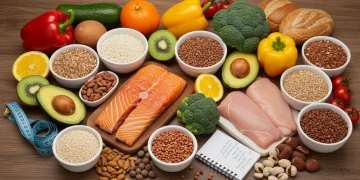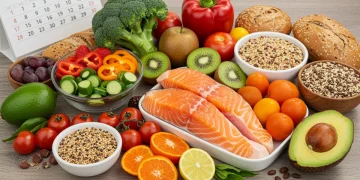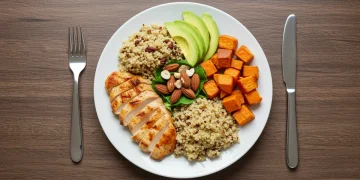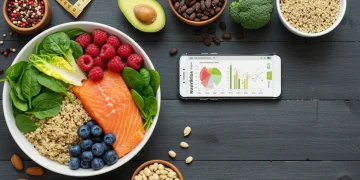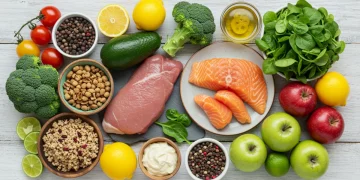Navigating Plant-Based Diets: 2025 Guide to Complete Nutrition
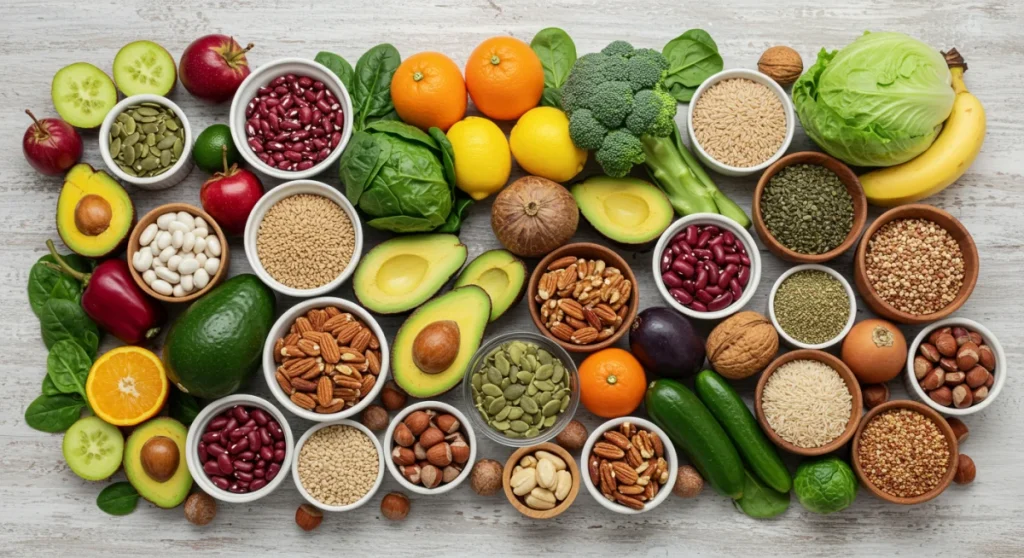
Thriving on a a plant-based diet in 2025 requires strategic planning to ensure comprehensive nutrient intake and prevent deficiencies through informed food choices and supplementation.
Embarking on a plant-based journey can be incredibly rewarding for health and the planet, but it often raises questions about nutritional adequacy. This definitive plant-based nutrition guide for 2025 offers the insider knowledge and practical solutions you need to navigate these dietary choices with confidence, ensuring complete nutrition and avoiding common deficiencies.
Understanding the Plant-Based Landscape in 2025
The landscape of plant-based eating has evolved dramatically, moving beyond simple vegetarianism to encompass a wide spectrum of dietary choices. In 2025, a plant-based diet often signifies a commitment to consuming foods primarily derived from plants, minimizing or entirely excluding animal products. This shift is driven by increasing awareness of health benefits, ethical considerations, and environmental impact.
Adopting a plant-based diet doesn’t necessarily mean adhering to strict veganism; it can also include flexitarian, pescatarian, or lacto-ovo vegetarian approaches. However, for those leaning towards fully plant-exclusive diets, understanding the nutritional nuances becomes paramount. The key is to embrace the diversity of plant foods to build a robust nutritional foundation rather than simply removing animal products without strategic replacement.
The modern plant-based diet is no longer about restriction but about abundance. It encourages exploring a vast array of fruits, vegetables, whole grains, legumes, nuts, and seeds, each offering unique nutritional profiles. This approach, when well-planned, can provide all the necessary macronutrients, vitamins, and minerals for optimal health and well-being. The challenge lies in identifying potential nutrient gaps and proactively addressing them through informed food choices and, where necessary, supplementation.
Ultimately, a successful plant-based diet in 2025 is characterized by intentionality and education. It’s about making conscious decisions to nourish your body fully while aligning with your personal values. This foundational understanding sets the stage for a deeper dive into specific nutritional considerations.
Essential Nutrients: What to Prioritize on a Plant-Based Diet
One of the most common concerns about plant-based diets revolves around obtaining all essential nutrients. While it’s true that some nutrients are more readily available in animal products, plants offer an incredible array of alternatives and often come with additional health benefits like fiber and antioxidants. Strategic planning is crucial to ensure you’re not missing out on vital components.
Proteins, for instance, are often highlighted. While animal sources are complete proteins, many plant foods, when combined, can provide all essential amino acids. Iron, calcium, iodine, and omega-3 fatty acids are other areas that require attention. However, with the right knowledge, these can be easily managed through a varied diet and smart food choices.
Key Nutrient Focus Areas
- Protein: Combine legumes, grains, nuts, and seeds throughout the day.
- Iron: Consume iron-rich plants with vitamin C to enhance absorption.
- Calcium: Prioritize fortified plant milks, leafy greens, and calcium-set tofu.
- Omega-3s: Include flaxseeds, chia seeds, walnuts, and algal oil supplements.
Beyond these, other micronutrients like zinc and selenium also deserve consideration. Zinc can be found in legumes, nuts, seeds, and whole grains, while Brazil nuts are an excellent source of selenium. A diverse intake across all plant food groups helps ensure a broad spectrum of nutrients.
Prioritizing these essential nutrients means consciously incorporating specific foods into your daily meals. It’s about being proactive rather than reactive, making sure your plate is a colorful and nutrient-dense representation of the plant kingdom. This proactive approach forms the backbone of a truly healthy plant-based lifestyle.
Avoiding Common Deficiencies: Practical Solutions
While a well-planned plant-based diet can be incredibly healthy, certain nutrient deficiencies can arise if not properly addressed. The most commonly cited include vitamin B12, vitamin D, iodine, and sometimes iron or calcium. However, with modern knowledge and accessible resources, these are entirely preventable.
Vitamin B12 is perhaps the most critical for strict vegans, as it is not reliably found in plant foods. Supplementation is generally recommended. Vitamin D, on the other hand, is often deficient in the general population, regardless of diet, due to limited sun exposure, making supplementation a common recommendation for everyone. Iodine can be obtained through iodized salt or specific sea vegetables, but moderation is key for sea vegetables.
Strategies for Deficiency Prevention
- Vitamin B12: Consistent supplementation is paramount; fortified foods are a secondary source.
- Vitamin D: Regular sun exposure and a vitamin D3 supplement (from lichen for vegans) are crucial.
- Iron: Pair iron-rich lentils, spinach, and quinoa with vitamin C sources like citrus fruits.
- Calcium: Opt for calcium-fortified plant milks, tofu, and dark leafy greens.
Regular blood tests can help monitor your nutrient status, allowing for timely adjustments to your diet or supplement regimen. Consulting with a registered dietitian specializing in plant-based nutrition can provide personalized guidance and ensure all your bases are covered. This proactive and informed approach ensures you maintain optimal health while enjoying the benefits of a plant-based lifestyle.
Prevention is always better than cure, especially when it comes to nutritional deficiencies. By understanding the potential pitfalls and implementing these practical solutions, individuals can confidently maintain a thriving plant-based diet without compromising their health.
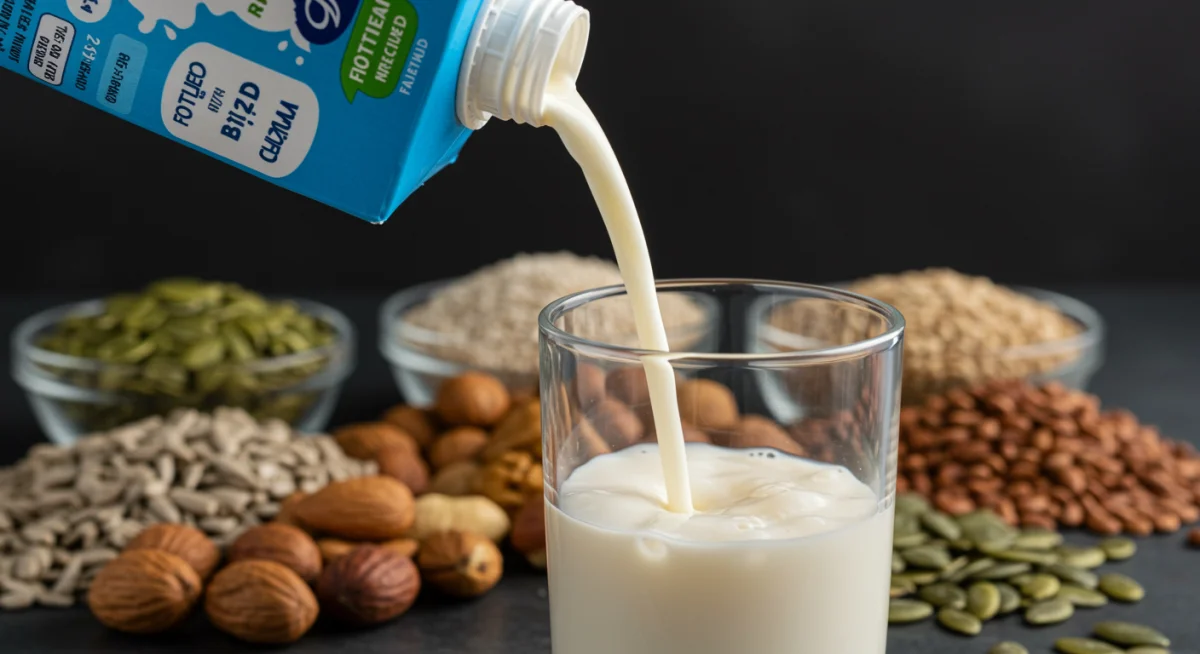
The Role of Fortified Foods and Supplements
In the evolving world of plant-based nutrition, fortified foods and supplements play an increasingly vital role in ensuring complete nutrient intake. While a diverse whole-food diet is the foundation, certain nutrients are either scarce or poorly absorbed from plant sources alone. Fortified products bridge these gaps, offering a convenient way to boost essential vitamins and minerals.
Fortified plant milks, for example, are a cornerstone for many, providing calcium, vitamin D, and often B12. Cereals and nutritional yeasts are also commonly fortified. Supplements, however, offer targeted solutions for nutrients that are particularly challenging to obtain, making them an indispensable part of a robust plant-based strategy.
Smart Supplementation Practices
- Vitamin B12: A non-negotiable supplement for all vegans.
- Vitamin D: Often recommended universally, but especially important for plant-based individuals with limited sun exposure.
- Omega-3 (DHA/EPA): Algal oil supplements provide the active forms directly.
- Iron/Calcium: Consider only if dietary intake is consistently low and confirmed by blood tests, under professional guidance.
It’s important to approach fortified foods and supplements with an informed perspective. Not all products are created equal, and understanding labels is key. For instance, checking the specific form of nutrients (e.g., D2 vs. D3 for vitamin D, or ferrous bisglycinate for iron for better absorption) can make a significant difference in efficacy.
Ultimately, fortified foods and supplements act as a safety net, ensuring that even on busy days or with less-than-perfect dietary choices, your body still receives the critical nutrients it needs. They are tools to optimize health, not a replacement for a varied and balanced plant-based diet. However, their strategic inclusion can elevate a good diet to a truly exceptional one.
Meal Planning and Preparation for Optimal Plant-Based Nutrition
Effective meal planning and preparation are the cornerstones of a successful and sustainable plant-based diet. Without a thoughtful approach, it’s easy to fall into repetitive eating patterns that may lead to nutritional imbalances or simply boredom. Strategic planning ensures variety, nutrient density, and culinary enjoyment.
Starting with a weekly meal plan helps in grocery shopping and reduces the likelihood of last-minute, less healthy choices. Incorporating a diverse range of food groups—legumes, whole grains, nuts, seeds, fruits, and a rainbow of vegetables—is essential. Thinking about nutrient pairings, such as combining iron-rich foods with vitamin C sources, can also maximize absorption.
Practical Meal Planning Tips
- Batch Cooking: Prepare large quantities of grains, legumes, and roasted vegetables for quick meals.
- Diverse Recipes: Experiment with international cuisines that naturally feature plant-based ingredients.
- Snack Prep: Have nutrient-dense snacks like nuts, seeds, fruit, or hummus and veggie sticks readily available.
- Label Reading: Become adept at understanding nutrition labels to identify nutrient-rich and fortified products.
Prepping ingredients in advance, such as chopping vegetables or cooking a batch of quinoa, can significantly cut down on daily cooking time. This makes it easier to stick to healthy eating habits even on hectic days. Having a well-stocked pantry with staples like canned beans, dried lentils, whole grains, and various spices can also make meal creation effortless.
The goal of meal planning and preparation is to make healthy eating accessible and enjoyable. By investing a little time upfront, you can ensure that your plant-based diet is not only nutritionally complete but also delicious and sustainable for the long term. This proactive approach empowers you to take full control of your dietary health.

Insider Knowledge: Advanced Strategies for Thriving
Beyond the basics, there are advanced strategies and insider knowledge that can elevate your plant-based diet from merely adequate to truly thriving. These involve understanding nuances of nutrient absorption, leveraging specific food combinations, and staying updated on the latest research in plant-based nutrition. It’s about optimizing every aspect of your diet for peak performance and health.
One such strategy is focusing on gut health. A healthy gut microbiome can significantly impact nutrient absorption. Including fermented foods like sauerkraut, kimchi, and plant-based yogurts, along with a high intake of fiber from diverse plant sources, can support a flourishing gut environment. This, in turn, enhances the body’s ability to extract and utilize nutrients from the foods you eat.
Advanced Nutritional Insights
- Phytates & Oxalates: Soaking, sprouting, and cooking legumes/grains can reduce anti-nutrients, improving mineral absorption.
- Choline: Important for brain health, found in tofu, soybeans, quinoa, and cruciferous vegetables.
- Selenium: Brazil nuts are a potent source; just 2-3 nuts provide your daily requirement.
- Creatine & Carnosine: While not essential, some plant-based individuals consider supplementing for athletic performance.
Another advanced tip involves understanding the bioavailability of nutrients. For example, iron from plant sources (non-heme iron) is less bioavailable than heme iron from animal products. However, combining non-heme iron with vitamin C dramatically increases its absorption. Similarly, pairing fat-soluble vitamins (A, D, E, K) with healthy fats (avocado, nuts, seeds) enhances their uptake.
Staying informed about emerging research is also crucial. The field of plant-based nutrition is constantly evolving, with new discoveries about nutrient interactions and optimal dietary patterns. Subscribing to reputable nutrition journals or following qualified plant-based dietitians can provide access to this cutting-edge information, allowing you to continually refine your dietary approach.
By applying these advanced strategies, you move beyond simply meeting your nutritional needs to actively optimizing your health and well-being. This insider knowledge empowers you to make highly informed choices, leading to a truly thriving plant-based lifestyle that supports long-term vitality.
Monitoring and Adjusting Your Plant-Based Diet
A plant-based diet, while incredibly beneficial, is not a static endeavor. It requires ongoing monitoring and periodic adjustments to ensure it continues to meet your body’s evolving needs. This dynamic approach is key to long-term success and optimal health, preventing any potential deficiencies from developing unnoticed.
One of the most effective ways to monitor your nutritional status is through regular check-ups with your healthcare provider. Discuss your diet with them and consider asking for specific blood tests to track levels of vitamin B12, vitamin D, iron (ferritin), and potentially iodine. These tests provide objective data that can guide any necessary dietary or supplementation adjustments.
Key Monitoring Practices
- Regular Blood Tests: Annually or biennially, check B12, D, iron, and other relevant markers.
- Symptom Awareness: Pay attention to fatigue, hair loss, or changes in mood, which could signal deficiencies.
- Dietary Review: Periodically assess your food intake for variety and nutrient density.
- Professional Consultation: Work with a plant-based dietitian for personalized guidance and adjustments.
Beyond clinical monitoring, it’s also important to be attuned to your body’s signals. How do you feel? Are your energy levels consistent? Is your digestion smooth? These subjective indicators, combined with objective data from blood tests, paint a comprehensive picture of your nutritional well-being. Don’t hesitate to seek professional advice if you notice persistent issues or have concerns.
Life circumstances also change—pregnancy, increased physical activity, or aging can all alter nutritional requirements. What worked perfectly for you a few years ago might need modification today. Being flexible and willing to adapt your plant-based diet ensures it remains perfectly tailored to your current life stage and health goals.
By actively monitoring your health and being prepared to adjust your dietary approach, you are taking a responsible and proactive stance on your well-being. This continuous feedback loop ensures that your plant-based journey is not just sustainable, but also optimally nourishing and supportive of your best health.
| Key Nutrient | Plant-Based Solution |
|---|---|
| Vitamin B12 | Mandatory supplementation or fortified foods. |
| Iron | Legumes, dark leafy greens, paired with Vitamin C. |
| Omega-3s | Flaxseeds, chia seeds, walnuts, algal oil supplements. |
| Calcium | Fortified plant milks, tofu, collard greens. |
Frequently Asked Questions About Plant-Based Nutrition
No, it’s generally not difficult. A varied intake of legumes, whole grains, nuts, and seeds throughout the day provides all essential amino acids. Foods like lentils, chickpeas, quinoa, and tofu are excellent protein sources, making it straightforward to meet daily requirements.
Yes, vitamin B12 supplementation is crucial for individuals on a strict plant-based diet. B12 is primarily found in animal products, and while some plant foods are fortified, a reliable supplement ensures adequate intake to prevent neurological and blood-related deficiencies.
To maximize iron absorption from plant foods, always pair iron-rich options like spinach, lentils, or fortified cereals with a source of vitamin C. Citrus fruits, bell peppers, and strawberries are excellent choices that significantly enhance non-heme iron uptake.
Absolutely. Many elite athletes thrive on plant-based diets. With careful planning to ensure sufficient protein, calories, and micronutrients, a plant-based diet can support rigorous training and recovery. Focus on nutrient-dense whole foods and strategic supplementation if needed.
Excellent plant-based sources of Omega-3s include flaxseeds, chia seeds, and walnuts, which provide ALA. For direct DHA and EPA, which are crucial, an algal oil supplement is highly recommended as ALA conversion rates can be variable.
Conclusion
Navigating a plant-based diet in 2025 is an empowering journey towards enhanced health and sustainability, provided it’s approached with knowledge and intention. By prioritizing essential nutrients, strategically utilizing fortified foods and supplements, and embracing thoughtful meal planning, individuals can confidently avoid deficiencies and unlock the full potential of plant-based eating. Continuous monitoring and a willingness to adjust will ensure your diet remains perfectly aligned with your evolving nutritional needs, leading to a vibrant and thriving lifestyle.
